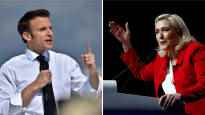Le Pen challenges Macron seriously. The Europe Letter covers key EU issues every Friday. You can order the entire letter to your email.
Rikhard Husu,
Janne Toivonen
Will it continue Emmanuel Macron As president of France, or is it surprising Marine Le Pen? This is currently being hotly debated here in Brussels.
Based on opinion polls, the incumbent president is in an advantage. The neck to the right of Le Pen is ten percentage points. The television argument between Macron and Le Pen also appears confirmed (switch to another service)shares of the incumbent president.
The French I am talking about are calm about the situation. The Le Pen National Alliance is not believed to appeal to the required majority.
SURPRISES can happen, of course. The shock caused by the British Brexit decision is still fresh in memory. Under Le Pen, France, and with it Europe, would enter new and unpredictable paths.
A vote for Le Pen would strengthen opponents of European democracy and freedom, the authors outline.
IN FRONT OF THE NEW of course we are anyway. Russia’s hostilities in Ukraine show no signs of abating. Citizens across Europe are asking why President Vladimir Putin is not being stopped.
The focus is on Germany, the EU’s economic locomotive, which fears for its security of supply and its businesses. The continuation of energy is justified, among other things, by the fact that sanctions should cause more harm to Russia than to Europe.
There is also no viable substitute for gas imported from Russia in the short term.
BACKGROUND IS also concerns about the unity of EU member states. The rise in energy prices could have unexpected political consequences for member states. This could rain on the Russian lair, Foreign Minister Pekka Haavisto reminds (you switch to another service).
More generally, the EU’s pain in imposing sanctions reflects the challenges of the unanimity requirement in foreign policy: when decisions require the approval of 27 member states, the lowest common denominator must go.
Of course, member states can intensify their own actions against Russia without the blessing of the EU. Germany announced on Wednesday that it would stop importing oil from Russia by the end of the year.
VISITED KIOVA President of the European Council Charles Michel promised the EU would do its utmost to increase pressure on Russia. The aim is, among other things, to increase arms aid.
Michel also promised a speedy processing of Ukraine’s application for EU membership. The Commission is due to present its assessment of Ukraine’s application by the end of June. It is then up to the member states to assess Ukraine’s prospects for EU membership.
The enlargement of the Union divides opinions and Ukraine cannot expect a quick band to join, despite general sympathies.
Let us then move on to the topics of the week in Europe and continue for a moment from France. The rest of the letter has been compiled by ‘s EU special editor Janne Toivonen.
Coming soon: Future conference is approaching the goal, sanctions with wallpaper
The last anticipated trilogy of negotiations on a major digital services act DSA is on the calendar today. It’s about big things for everyone, like whether digital companies need to make their all-encompassing algorithms transparent so we know how we’re being guided online.
So the French will be voting for their next president on Sunday, so next week we can safely dedicate the result to pan-European chewing.
Civic and participatory exercise future conference (move to another service) is approaching its goal. Elected citizens will travel to Strasbourg for the last time under Labor, ie next Friday. The final proposals will be adopted, with a final report for Europe Day on 9 May.
The official meetings of the Council are still on hiatus, but behind the scenes a massage on the content of the next package of sanctions and, above all, on Russian energy continues.
You can discuss the content of the letter from the link below. The debate is open until Saturday 23 April. until 11 p.m.
